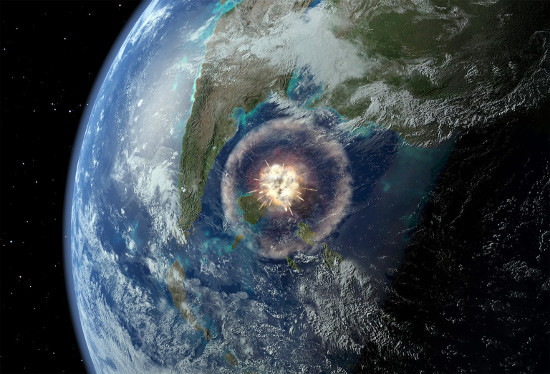Humans are a natural product of Darwinian evolution. An improbable, unpredictable product perhaps, but nevertheless one that conforms to the evolutionary path followed by all other species.
Humans are also latecomers on the universal scene, they appeared on Earth during the last inch of the cosmic mile. Our specific subspecies of Homo Sapiens only emerged a couple of hundred thousand years ago, on a planet that is 4.5 billion years old.
We are here, among other things, because some sixty-six million years ago an asteroid with a cross section roughly the area of Manhattan happened to slam into the Earth, wiping out the dinosaurs, thereby giving a chance and creating an ecological niche for mammals (Figure 1).

Figure 1. A computer depiction illustrating an asteroid hitting the Yucatan peninsula 66 million years ago. Credit: Joe Tucciarone, Science Photo Library/Corbis.
These are humbling realizations.
We are here not because of some grand cosmic plan, but rather as an accidental outcome of the operation of the laws of nature.
This awareness is also accompanied by certain responsibilities. First, to understand our origins, we must examine the scientific details and construct the story of the universe and of life on Earth, one intellectual brick at a time.
Second, until we find (if we do) extrasolar life, life on Earth (and "intelligent" life in particular) remains unique.
A few of my colleagues even argue that the fact that we haven't found any signs of intelligent civilizations in the Galaxy so far, may mean that we are the first one to reach intelligence. While I don't find those arguments particularly compelling, the mere fact that they may be true, puts a heavy burden of responsibility on our shoulders.
In a letter sent by Benjamin Franklin on February 8th, 1780, he wrote:
"O, that moral Science were in as fair a way of improvement, that men would cease to be wolves to one another, and that human beings would at length learn what they now improperly call Humanity."
I wholeheartedly agree.